The Ph.D. Process
The Ph.D. Process
A Students Guide to Graduate School in the Sciences
Dale F. Bloom
Jonathan D. Karp
Nicholas Cohen

Oxford University Press
Oxford New York
Athens Auckland Bangkok Bogo Bombay
Buenos Aires Calcutta Cape Town Dar es Salaam
Delhi Florence Hong Kong Istanbul Karachi
Kuala Lumpur Madras Madrid Melbourne
Mexico City Nairobi Paris Singapore
Taipei Tokyo Toronto Warsaw
and associated companies in
Berlin Ibadan
Copyright 1998 by Dale F. Bloom, Jonathan D. Karp,
and Nicholas Cohen
Published by Oxford University Press, Inc.
198 Madison Avenue, New York, New York 10016
Oxford is a registered trademark of Oxford University Press
All rights reserved. No part of this publication may be reproduced,
stored in a retrieval system, or transmitted, in any form or by any means,
electronic, mechanical, photocopying, recording, or otherwise,
without the prior permission of Oxford University Press.
Library of Congress Cataloguing-in-Publication Data
Bloom, Dale F., 1949
The Ph.D. process : a students guide
to graduate school in the sciences /
Dale F. Bloom, Jonathan D. Karp, and Nicholas Cohen.
p. cm. Includes bibliographical references and index.
ISBN-13 978-0-19-511889-6; ISBN-13 978-0-19-511900-8 (pbk.)
1. ScienceStudy and teaching (Graduate)
2. BiologyStudy and teaching (Graduate)
3. Doctor of philosophy degree.
4. Graduate students.
I. Karp, Jonathan D., 1964 .
II. Cohen, Nicholas, 1938 . III. Title.
Q181.B5574 1998 507173dc21 97-37159
5 7 9 8 6 4
Printed in the United States of America
on acid free paper
To Ted Melnechuk:
For years of encouragement, support, friendship,
humor, wisdom... and newspaper clippings.
Your extraordinary intellect and breadth of sight
has brought me delight and sustenance.
D.F.B.
Contents
Acknowledgments
We are indebted to the many scientists and graduate students, too numerous to mention individually, who contributed to this book by agreeing to be interviewed or by responding to our questionnaire. Their personal accounts and thoughtful advice on all aspects of the graduate school experience truly made the book come alive. Particular thanks go to: Cynthia Carey, Snezhana Dimitrova, Barry Goldstein, Sheila Kelley, Basia Kruszewska, Julie Rehm, Elizabeth Stein, and S. ThyagaRajan, for their time and astute comments; Ted Melnechuk for providing a wealth of invaluable information; Anne Myers for her insightful and wonderful words; our agent, Richard Balkin, for believing in the project; our editor, Kirk Jensen for perspicacious observations and suggestions; and Gary Boehm, Tracy Callahan, Ineke Cohen, John Frelinger, Paula Geiselman, George Kimmich, Greg Maniero, and Rick Willis for carefully reviewing the manuscript and making perceptive and valuable recommendations.
D.F.B., J.D.K., & N. C.
I am indebted to wonderful scientists who made my experiences as a graduate student at UCLA so meaningful and memorable: Art Arnold, who by example and instruction first taught me how to think like a scientist; George Bloch, who as a postdoc gave so much of his time and was a true mentor; and Roger Gorski, who wisely guided me through the intricacies of systems neuroscience and gave me unusual freedom to explore. Emilio Decima, Carlos Grijalva, Wendy Macklin, Irv Maltzman, Paul Micevych, Charles Sawyer, Elizabeth Stein, and David Whitmoyer are talented and spirited researchers who inspired me and provided assistance and counsel. Fellow graduate students, so much a part of the educational experience, delighted me with their inquiring minds and enthusiasm. It was a joy to be in the company of Laura Allan, Gayle Boyd, Hao-Dong Cai, Robin Dodson, Julian Levy, Fredricka Martin, Greta Mathews, Andrea Moskowitz, Rich Nahin, Laura OFarrell, Yehuda Shavit, and June Stapleton. For years of encouragement and support, I wish to recognize with appreciation and love my family: Betty, Richard, Steven, and Ronnie Bloom, Harry Mann, and Maisie Samuel. Finally, I acknowledge my dear friend Thea Iberall, who at the moment of initial indecision, e-mailed those crucial and deciding words: Go for it!
D.F.B.
Heartfelt thanks to my mentors: Gerhard Fankhauser and John Boner who introduced me to research; Hans Holtfreter who taught me to ask questions of Nature; Bill Hildemann, a role model whose life remains intertwined with mine; and my past and present graduate students and postdocs who now understand what its all about.
N.C.
The present form of this book would not have been possible if it were not for the graduate school underground: the collective students, postdocs, and faculty members who agreed to speak openly. I am privileged to have participated in their catharsis. With them, I proclaim that this book is for the graduate students of the future, from the graduate students of the past.
J.D.K.
Preface
The world of a graduate student in the sciences is privileged and wondrous. One is surrounded daily by skillful researchers bustling about confidently doing sciencepeople who are making genuine strides in the understanding of nature, discovering the knowledge that will fill the textbooks of the future. Some of these researchers may be world leaders in their fields; others may be relatively unknown, but on the verge of great discoveries. In this high-tech environment, at the very forefront of knowledge, life is exciting, challenging, and stimulating. Every day can bring new insights, new directions, new revelations.
And here you are, a new graduate student, about to become an important participant in this restricted and extraordinary world. Surely you are excited and thrilled by the opportunity granted you. But you are likely also to be feeling somewhat confused and perhaps anxious at the prospect. Exactly where do you fit in? What is expected of you? What will your daily life be like? What is the best way for you to proceed to insure the successful completion of your education, and future success in your chosen profession?
Your confusion about these issues is understandable. In fact, it may even persist for quite a while after you arrive. Some students never figure it all out, and their careers suffer or never begin. The confusion and uncertainty stem from a peculiar characteristic of graduate school: the rules of the game are rarely talked about!
Contrary to what you might be expecting, unless you have a wonderful mentor, you are unlikely to receive explicit guidance as to what you should or should not be doing in grad school. A graduate program has a certain vague and open-ended character. There is no rigid agenda, no circumscribed plan of action, no set timetable. Little is mapped out for you. You will not take any specific courses on how to be a scientist, and no one will stand by you and teach you all the tricks. How, then, do you learn? Yes, there are some classes that you will be required to take, but will these be your main source of information, and are grades really important? What about research, that singularly most important aspect of graduate school: In whose lab will you work? What will you work on? How do you gain expertise? Who can help you? How hard do you have to work?
Logical reasoning, critical analysis, scientific writing, public speaking, networking, and other such skills are also elements to be mastered during graduate school, but how are they perfected? There are so many components to a graduate education, but which ones are critical for future success, and deserve most of your energy and time? What decisions can make or break your career? Keep in mind that graduate school is not an experiential extension of undergraduate education, where the passing of a sufficient number of courses guarantees one a degree. Nor is it medical school or law school, where a delineated and set curriculum gives order, structure, and time limits to the educational experience. This is graduate school in the sciences, where each student in the program has a different experience, learns different skills and different information, and finishes at a different time; where poor choices can delay the degree by years; where you are relatively free to use your time as you see fit; and where you will sink or swim, depending upon
Next page
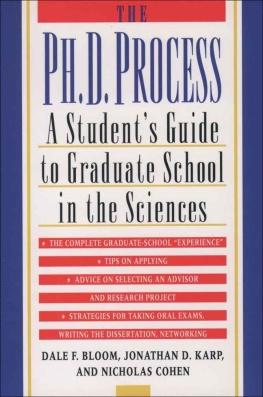
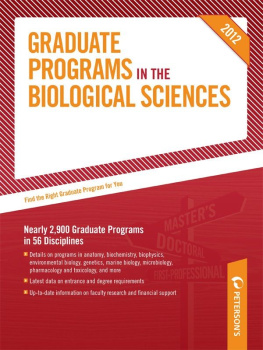

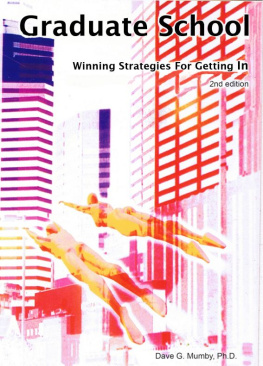
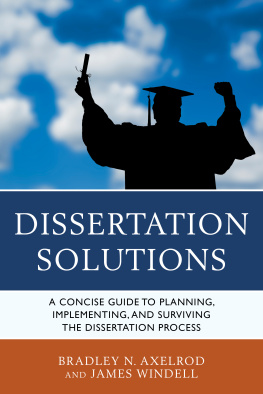
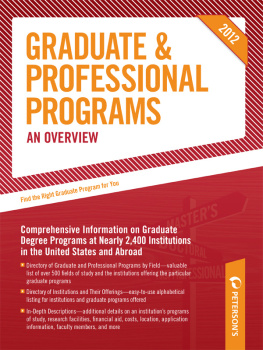
![Reding - Grads Guide to Graduate Admissions Essays] : Examples from Real Students Who Got into Top Schools](/uploads/posts/book/101661/thumbs/reding-grad-s-guide-to-graduate-admissions.jpg)
